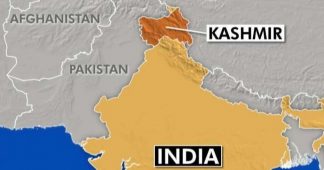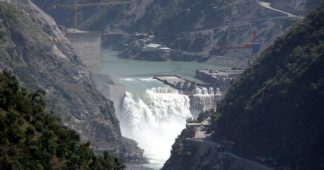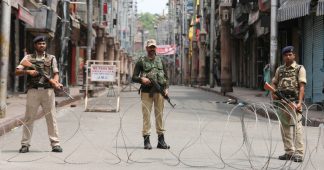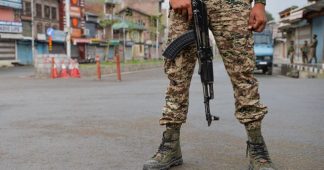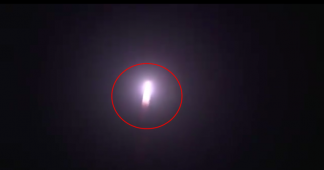Indian official tells New York meeting: ‘It has happened in the Middle East. If the Israeli people can do it, we can also do it’
26 November 2019
At a private event on Saturday in New York City, Sandeep Chakravorty, India’s consul-general to the city, told Kashmiri Hindus and Indian nationals that India will build settlements modelled after Israel for the return of the Hindu population to Kashmir.
Speaking to Kashmiri Hindus, known as Pandits, and Indian nationals at the event, organised to discuss Indian filmmaker Vivek Agnihorti’s forthcoming project on the forced displacement of Kashmiri Hindus in the early 1990s, Chakravorty asked those present to give the government some time to implement its plans in the valley.
“I believe the security situation will improve, it will allow the refugees to go back, and in your lifetime, you will be able to go back … and you will be able to find security, because we already have a model in the world.
“I don’t know why we don’t follow it. It has happened in the Middle East. If the Israeli people can do it, we can also do it,” Chakravorty said.
The event held in New York is one of a number of events held at the behest of India’s right-wing government in its attempt to wrestle back contol of the narrative in the face of the immense grassroots mobilisation against its actions in Kashmir.
It is also the latest incarnation of the Indian government’s goals of a settler-colonial policy for the valley, which Kashmiri academics and scholars have long warned is the ultimate ambitions of the Indian state.
“I think the return of Kashmiri Pandits is being instrumentalized to justify a settler-colonial project in Kashmir,” Mona Bhan, an associate professor of South Asian Studies at Syracuse University in New York, said.
Bhan told Middle East Eye that there remains a deep anxiety among Kashmiri Pandits that their pain is being weaponised to further the goals of the BJP-led government. She says the event on Saturday seemed to be an attempt to allay those fears.
“But the conflation of Kashmiri Pandits with Indian Hindus and talk of an Israeli model means that you are preparing for Kashmiri Pandits to return as settlers,” Bhan told MEE.
On 5 August, the Indian government placed more than seven million people under a communication blackout, going on to illegally abrogate Article 370 effectively ending Kashmir’s semi-autonomous status.
India’s actions has drawn condemnation from US lawmakers, human rights groups as well as prompted two US Congressional hearings, in which there was a call for foreign delegations and foreign journalists to be allowed into the valley. Thus far, only a far-right European delegation has been allowed in while foreign journalists have not been allowed to enter the valley since August 5.
Chakraborty, the Indian consul-general, slammed international interest and interference into the matter.
“[The issue is) getting pulled into the [UN] Human Rights Council. It’s getting pulled into the US Congress.
“A delegation wants to go. But go to other places. Go to Syria, Iraq, Afghanistan. No one is talking about taking photos there. So why do they want to come to our place? They don’t like it now that we are now asserting ourselves,” Chakravorty said.
As part of its justification for scrapping Articles 370 and Article 35A, which ensured that those from outside Kashmir could not purchase land in the state, the BJP-led government has repeatedly promised the return of the Hindu minority who left Kashmir during the height of the insurgency against Indian rule in the early 1990s.
Estimates vary, but more than 100,000 Kashmiri Hindus left during the upheaval. According to government figures, 219 Kashmiri Pandits were killed between 1989-2004.
Pro-freedom leaders in Kashmir have repeatedly called for the return of Kashmiri Pandits, but have urged them to return as neighbours and not settlers.
Since the insurgency began in the late 1980s, more than 70,000 Kashmiri Muslims have died, while an estimated 7,000 others have “disappeared”.
Many have asked if I am attending this event. I am not. I typically only attend campus events with educational value.
I encourage everyone attending to educate themselves about the speaker. I urge all students — especially female students and Muslim students — to stay safe. pic.twitter.com/vbwak55bSP
— Audrey Truschke (@AudreyTruschke) November 21, 2019
At the event on Saturday, parts of which was broadcast on Facebook Live, Bollywood actor Anupam Kher and visiting filmmaker Agnihorti praised the Indian government for taking the bold step to change Kashmir’s status.
Kher, known to be staunch Modi supporter who previously described India’s actions in August as a “final solution“, said that it “took 70 years to abrogate Article 370; let’s celebrate that.”
Agnihorti, currently on a roadshow to promote his film on the experience of Kashmiri Pandits, which he describes as “India’s holocaust”, has faced a barrage of criticism and condemnation from Kashmiri activists and student groups for spreading right-wing propaganda as well as over claims of sexual harassment in India.
Last week, an event at Rutgers University had to be moved to a temple in Edison after an outcry from students and academics.
Organisers of the event deny that the outcry prompted its cancelation at Rutgers.
On Saturday, Kher dismissed the criticism as people being “frightened” of Agnihorti’s film.
I am strong proponent of free speech. I am also a strong proponent of bringing speakers @RutgersU who model intellectual rigor & integrity, which our students deserve. This speaker has neither, as his record clearly shows. I wish someone had advised against it. https://t.co/Ilj99KkQA1
— Sylvia Chan-Malik (@schanmalik) November 18, 2019
Israeli-India relations have intensified since the election of Narendra Modi in 2014. India is Israel’s biggest purchaser of arms, amounting to $1bn per year.
Both India and Israel have used the spectre of Islamic terror to justify their security policies and the need for partnership.
On Monday, Agnihoti delivered a lecture at an event jointly organised by the American Jewish Council and the Hindu Jewish Council.
Invoking the Jewish experience
On Saturday, the consul-general also said that if Kashmiri Pandits were afraid of losing their culture, they needn’t look further than the experiene of the Jewish people, who he said “kept their culture for 2,000 years outside their land, and [then] they went back.
“We all have to keep the Kashmiri culture alive. The Kashmiri culture is the Indian culture, it is the Hindu culture. I feel as much Kashmiri as anyone else,” he said to applause.
Theresa Matthew, a New York City-based activist with South Asia Solidarity Initiative (SASI), told MEE that though she was not surprised by the video, it was still “always breathtaking to witness the sheer peddling of lies by senior government officials.
“The violent re-writing of the subcontinent’s history is angering, stunning and also tiring. It’s a familiar tactic that relies on nationalism, Brahminism and Islamophobia. It has little to do with displaced Kashmiri Pandits,” Matthews told MEE.
In early August, India sent tens of thousands of additional troops to Kashmir.
Though landlines and post-paid mobile phones have been reconnected in Kashmir since the communicat9ions blockade was announced, prepaid phones, text messaging and internet services are still down in Kashmir.
There are more than 700,000 Indian troops in Kashmir, in what is described as the most militarised region on earth. Since 1947, Kashmir has been divided between India and Pakistan, with a small portion held by China.
Published at https://www.middleeasteye.net/news/india-consul-general-united-states-calls-israeli-solution-kashmir
